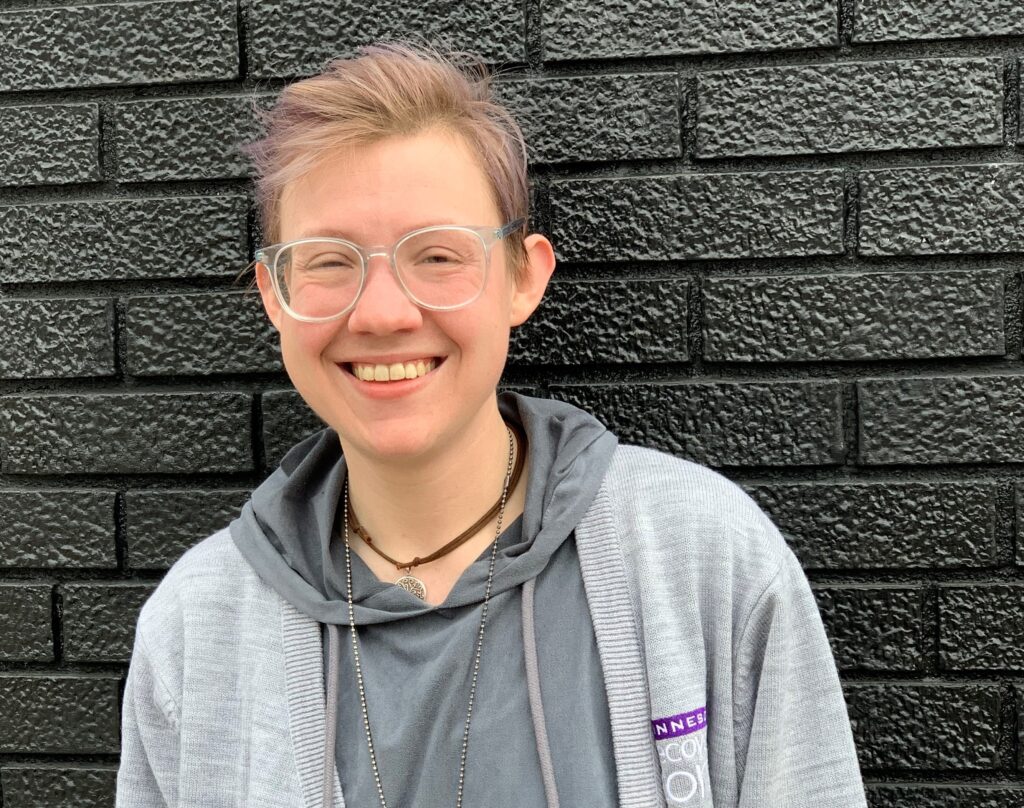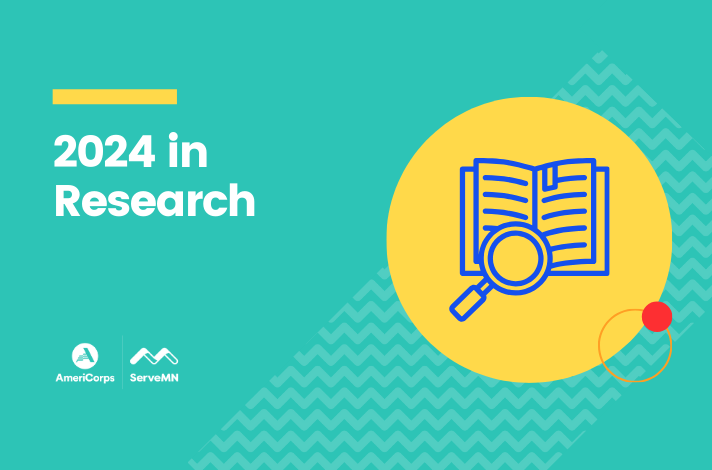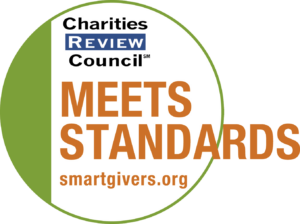Quinn Forss was looking for a new opportunity to refocus his career when he learned about Minnesota Recovery Corps.
As a person in active recovery, Quinn liked the idea of serving and helping others. He’d graduated from college several years earlier with a double major in Creative Writing and Women’s Studies, but college had been difficult because of substance use issues — and the years after college were challenging as he began recovery.
“I deal with chronic pain, and in 2013, it went off the rails. I’ve had chronic health issues most of my life but the physical pain became very difficult to manage, and I was trying to finish up college, so it snowballed really quickly,” Quinn said. “I wasn’t getting individualized care. I was far away from accessing my doctor. He saw that I was in pain and wanted to help, and the solution in his eyes was opioids, and I really needed more support than that. My mental health was also not super good, and those two things collided. I became kind of a poster child of the opioid crisis.”
By 2017, Quinn had also started drinking excessively and reached a point that he realized, “You will die if you keep doing this,” he said, and he sought support to begin recovery from substance use disorder.
“Not everybody needs to hit rock bottom to find recovery, but I didn’t see a way out,” Quinn explained. “It was what needed to happen to me in order to recognize that I needed to make some big changes.”
He did, and in the fall of 2019, Quinn signed up to serve as an AmeriCorps member in Minnesota Recovery Corps and was placed at P.E.A.S.E. Academy, a recovery high school in Minneapolis, where he has spent the past school year helping students and staff.
AmeriCorps Service at a Recovery High School
At first, Quinn, who is 26, was not sure about working with teens.
“But it’s been really awesome. It doesn’t take me too long to remember what it was like to be in high school. The neat thing is to be able to connect on a peer-to-peer level because I think a lot of teenagers get told, ‘I’m an authority figure and you’re a teenager – you’re going to listen to me.’ But just the way Recovery Navigators are set up as peer support specialists, it just kind of takes out that authoritative relationship.”
Instead, Quinn said, a Recovery Navigator can relate to the students through their shared experience with addiction. “So it’s like, ‘I’m in recovery myself, I know what it’s like to be young and dealing with addiction, and there’s no judgment here. We’re all just struggling each day together.’ It has been neat to have that opportunity to show the kids that they’re way more equipped to deal with the world than they think because they have dealt with so much at such a young age.”
Helping Students Set Individualized Goals
How much does he share with the students about his own experience? Quinn says he’s an open book, and if a student is open to hearing his story, he will share in order to help them recognize that nobody is perfect and that stability is achievable.
“Being able to think there’s something after that when you are in the thick of experiencing bad things is super helpful: ‘I dealt with that. It sucked, but I’m here now, and it got better.’ I talk very openly about the way that disability informs my recovery and addiction as well as my general mental health stuff.”
Helping students develop goals and find resources to support those goals is a part of Quinn’s service in Recovery Corps, and the goals are different for everyone – “one student may work on improving their academics, while another tries out some new types of sobriety support meetings,” he said.
Quinn, who identifies as a queer transgender male, said that he also wants students to see that like him, they have unique experiences and will require individualized care and resources in their recovery.
“I try to be very open about who I am and where I’ve been because it helps people to recognize that they can get through it and you should think about yourself as a whole person as you try to find the right resources for you,” Quinn said. “I often say that recovery, for me, is relearning how to be a human being–there’s so many facets, and it can be hard to know how to fit those pieces back together. The least I can do is help find the corner pieces to frame the puzzle, and it’s up to participants to build the picture they want their life to be.”
Shifting to Virtual Service
With schools in Minnesota moving suddenly to distance learning in March in the wake of the COVID-19 crisis, Quinn’s service was transformed, too. Along with the rest of the faculty and staff at P.E.A.S.E., Quinn continued to engage with students online through virtual meetings and check-ins and said he was incredibly impressed with the dedication of the P.E.A.S.E. staff, who assured all students could access the internet from home.
“It’s their tether to a sense of community in a time of isolation, and ensuring that everyone has that tether has been a major focus,” he said. “I’m very proud of what I’ve done with students during this time, especially the chance to learn together and discuss interesting topics that expand our perspectives but still give us a break from the stress of our daily lives.”
A Future in Peer Support
Quinn, who is spending the summer as the Minnesota Recovery Corps community outreach coordinator, has decided to serve a second term in Recovery Corps next year. AmeriCorps members in Recovery Corps have access to the Recovery Coach Academy through Minnesota Recovery Connection, which is a thorough curriculum on how to be a peer recovery specialist. Quinn plans to complete the program, become certified and work in peer support after finishing a second term in Recovery Corps.
“I’ve just loved AmeriCorps so much, and I have really loved the trainings we’ve received as part of AmeriCorps,” he said. “Plus, in Recovery Corps, you’re able to do so much of what is already happening within the industry right out of the gate, and you get a lot of training and support to be able to do that.”
Serving at P.E.A.S.E. Academy this past year has been a perfect first step into that world, he said.
“It’s been so awesome. It’s an honor to be trusted with these students’ stories and their experiences – even just sharing that space with them when we don’t talk,” Quinn said. “It’s an honor for me, and I hope it helps them.”





